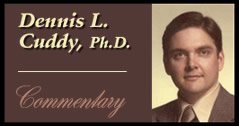Other
Cuddy
Articles:
Sept. 11:
Hold Government
Accountable
An
Economic Assault on
African-Americans and Others in The US
THE LEIPZIG SCHOOL
By
Dennis L. Cuddy, Ph.D.
June 25, 2004
NewsWithViews.com
The last several years, a great deal of attention has been paid to the effects upon American society of the Frankfurt School, associated with names like Georg Lukacs, Max Horkheimer, Eric Fromm, Theodor Adorno, Wilhelm Reich and Herbert Marcuse. However, practically no attention has been given to the effects of the Leipzig School, which is equally important. The following is an outline of the background and history of the Leipzig School.
1� Rousseau's Social Contract and Swiss educator Pestalozzi (Illuminati code name "Alfred") impacted French Revolution.
2� Pestalozzi's philosophy in American schools 1806, and believed religion should not be the guiding principle in education. Horace Mann (father of American public education) picked up on this.
3� Weishaupt infiltrated French Revolution and through education accomplished many goals. The Illuminati also placed its people with future rulers (e.g., Czar Alexander I) to educate them.
4� Comte de St. Simon's scientific and collectivist socialism was an industrial feudalism ruled by self-appointed elite. Robert Owen and son and New Harmony followed from this, and Orestes Brownson said their goal was to have national education without Christianity.
5� St. Simon's secretary Auguste Comte coined "Sociology" 1838, and during this time, Ludwig von Westphalen taught St. Simon's principles to von Westphalen's son-in-law, Karl Marx.
6� Skull & Bones formed at this time (early 1830s) from German university corps, and will use elitist swastika symbol.
7� August Comte's System of Positive Polity volumes published around 1850, attacking culture (before Gramsci) with a "Religion of Humanity" (humanism rather than Christianity). "Positivism" takes over our courts with Positivists like Holmes and Frankfurter saying the Constitution means whatever they say it means, in a humanistically relativistic sense (Holmes writes Harold Laski that all the unfit, including fundamentalists, should be sterilized).
8� St. Simon's elitist-controlled socialistic industrial feudalism is picked up by John Ruskin (swastika on grave) who reads Plato daily and believes children belong to whole community. Ruskin belongs to Society for Psychical Research.
9� Ruskin is mentor of Cecil Rhodes (and Gandhi), and Rhodes forms secret society to take the government of the world.
10� At the same time Rhodes is listening to Ruskin, Wilhelm Wundt (grandfather code name "Raphael" with Illuminati) begins experimental lab in 1870s at Leipzig University. Wundt arrives in 1875 and lab begins 1879. Pavlov comes to Leipzig to study 1884, and G. Stanley Hall is Wundt's first American Ph.D. student.
11� Hall brought to Johns Hopkins University by Skull & Bones member Daniel Coit Gilman, and Hall mentors John Dewey (father of Progressive Education) there. Dewey is member of Society for Psychical Research and is an educational psychologist. Also at Johns Hopkins in late 19th century are Woodrow Wilson and Abraham Flexner. Flexner was mentored by Hall and later goes with Rockefeller's General Education Board, whose chairman Frederick Gates talks about rural folk in the "moulding hands" of the elite. Gates is a Baptist leader, and in 1919 the American Baptist Society will publish W.Z. Batten's The New World Order referring to the need for Social Control and a "world federation." The General Education Board was founded in 1902, the year after E.A. Ross (Socialist) wrote Social Control describing control by the "Elite." Abraham Flexner, mentioned above, will become a Rhodes lecturer and will form the Institute for Advanced Studies at Princeton modeled after Oxford's All Souls College.
12� Russian Alexander Luria is a follower of Wundt, and other American Ph.D.s from Wundt include Charles Judd (mentor of Edward Lee Thorndike) and James McKeen Cattell (heads Psychological Corporation, which sought key people placed in key positions, and tests used at the Carnegie-funded first Governor's School in the nation in 1963 attended by Dennis Cuddy, with Psychological Corporation wanting to keep tabs on us) and James Earl Russell (head of Psychology Department at Columbia University Teachers College).
13� Hall's student, John Dewey, early 1900s member of the Intercollegiate Socialist Society (later called the League for Industrial Democracy with Dewey its president), and in 1904 Dewey joined the faculty at Columbia University Teachers College.
14� Dewey known as "Father of Progressive Education" and he was honorary president of the National Education Association in 1932. The NEA in 1912 began to promote the training of teachers in sex education (before sex education promotion of Bela Kun regime in Hungary, under which Georg Lukacs in 1919 became Deputy Commissar for Culture and founded the Institute for Marxist Research which was renamed the Institute for Social Research, or Frankfurt School).
15� Dewey 1916 Democracy and Education says independent individualist has form of "insanity" as "the group" is what counts.
16� Dewey 1919 with Institute for International Education which holds 1930s Moscow Summer Sessions to train young Americans in Soviet philosophy. On the National Advisory Council of IIE is Frank Porter Graham (president of the University of North Carolina 1930-49), who was "active in the fierce fight against a proposed New York state law to bar from the teaching profession any one advocating overthrow of the government by force and violence." (Chicago Daily Tribune, August 6, 1946, pp. 1,4.)
17� Dewey 1920s in Russia and loves Bolshevism and undermining church and family, and he describes it in The New Republic (December 5, 1928).
18� Dewey 1929 Individualism Old and New says we're in for some kind of socialism in U.S.
19� Dewey 1933 Humanist Manifesto and 1934 A Common Faith (dogmatic religions will have to surrender).
20� Dewey's influence at Columbia University Teachers College great and by early 1950s it was producing one-third of 160 largest school systems' principals and superintendents.
21� Progressive education controlled the classrooms by early 1960s. August Comte had argued that the intellect should be subordinated to the heart, and in early 1960s affective education replaced cognitive (academic basics) as most important. It would hurt Johnny's self-esteem to fail him, so there was grade inflation and social promotions. Moral absolutes were out, and values clarification brought humanistic moral relativism in via situation ethics.
22� Dewey disciples include George Counts (initially loved Russia, and was research director for 1930s Commission on the Social Studies, promoting socialism via schools), Harold Rugg and William Kilpatrick. The Commission on the Social Studies was funded by the Carnegie Foundation, and in B.K. Eakman's Cloning of the American Mind, one reads that Dewey, Russell and Thorndike at Columbia University Teachers College "steeped the College in Wundtian educational philosophy - with the aid of a $450,000 gift from oil tycoon John D. Rockefeller�. In the 1930s and 1940s, the Carnegie forces and the Psychological Corporation worked closely with G. Stanley Hall,� Edward Thorndike of Teachers College, John Dewey and the other American Wundtians, to connect, solidify, and proliferate Wundtian psychology, a primary feature of which is the socialistic worldview�. Carnegie's helpmates in the states and testing companies helped to ensure implementation of Wundtian social and educational packages."
23� Most public school educators today proudly proclaim they are "progressive educators," and at the university level, Dewey was co-founder in 1919 of the New School for Social Research which became America's first university for adults. In 1997 it was officially renamed New School University and currently enrolls more than 25,000 students annually. The New School continues to maintain its tradition of educational innovation. The World Policy Institute, through its association with the New School's new Master's degree program in International Affairs, helps train tomorrow's professionals in the field. Former U.S. Senator Bob Kerrey is president of the New School University and a member of the 9/11 Commission in 2004.
24� Wundtian psychologist Kurt Lewin comes to the U.S. 1933 promoting his theories of group dynamics.
25� Rockefeller Foundation 1933 focused on "social control" research, and in 1938 funded the Radio Project at Princeton University (Frankfurt School Theodore Adorno musical director) and in 1945 funded Tavistock Institute for Human Relations based on Lewin's principles ("social chaos" theory followed by Tavistock's Fred Emery's "social turbulence" theories where people and groups can go into psychological retreat due to emotional and other crises). Lewin was with OSS (later called CIA) in WWII.
26� In the 1990s, the Tavistock Institute and the European Commission worked on a feasibility study to research the effect of using Smart Cards in competence accreditation. The study will be carried out in the USA and parts of Europe. The project involved assessing and validating students' skills, with information placed on personal skills Smart Cards, which "become real passports to employment."
|
Subscribe to the NewsWithViews Daily News Alerts! |
27� In October 1997, the Tavistock Institute (and Manchester University) completed the final report for the European Commission, and described in a report summary were the relevancy of Goals 2000, SCANS (U.S. Department of Labor Secretary's Commission on Achieving Necessary Skills) typology with its "profound implications for the curriculum and training changes that this will require," valid skills standards and portable credentials "benchmarked to international standards such as those promulgated by the International Standards Organization (ISO)." The report summary went on to say that "there is increasing attention being focused on developing global skill standards and accreditation agreements," and there will be "partnerships between government, industry, and representatives of worker organizations� [and] a high degree of integration� embedding skills within the broader context of economic and social activity, and specifically within the areas of secondary education, work-based learning and local and regional economic development�. The National Skill Standards Board, Goals 2000, School-to-Work program are all combining to act as a catalyst to promote the formation of partnerships to develop skills standards."
� 2004 Dennis Cuddy - All Rights Reserved
Sign Up For Free E-Mail Alerts
E-Mails are used strictly for NWVs alerts, not for sale
Dennis Laurence Cuddy, historian and political analyst, received a Ph.D. from the University of North Carolina at Chapel Hill (major in American History, minor in political science). Dr. Cuddy has taught at the university level, has been a political and economic risk analyst for an international consulting firm, and has been a Senior Associate with the U.S. Department of Education.
Cuddy has also testified before members of Congress
on behalf of the U.S. Department of Justice. Dr. Cuddy has authored or
edited seventeen books and booklets, and has written hundreds of articles
appearing in newspapers around the nation, including The Washington Post,
Los Angeles Times and USA Today. He has been a guest on numerous radio
talk shows in various parts of the country, such as ABC Radio in New York
City, and he has also been a guest on the national television programs
USA Today and CBS's Nightwatch.
The National Skill Standards Board, Goals 2000, School-to-Work program are all combining to act as a catalyst to promote the formation of partnerships to develop skills standards."








